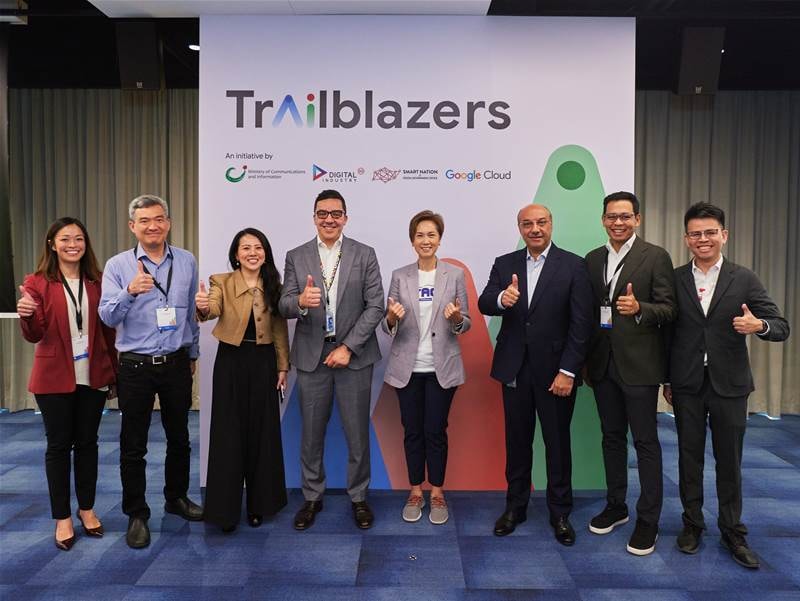The secret to Singapore becoming a leading artificial intelligence powerhouse
Singapore, a small island nation in Southeast Asia, is creating a major revolution in the field of artificial intelligence (AI). With smart policies and strong investment in technology, the island nation is quickly becoming one of the world's leading AI hubs.
In the digital age, AI is not just a technological tool but also a determining factor of business success or failure. From automating processes, analyzing big data to make smart decisions, to creating new products and services, AI is revolutionizing every aspect of business operations.

Recognizing this importance, Singapore has set its sights on becoming a world-leading AI innovation hub, offering businesses the opportunity to take full advantage of the technology’s potential, from access to top talent, state-of-the-art infrastructure to supportive policies.
Building a national AI strategy 2.0
Singapore has established itself as a leader in AI by launching its National AI Strategy in 2019. Recently, the island nation has taken its commitment to the next level with the National AI Strategy 2.0 (NAIS 2.0), along with an investment of up to US$750 million over the next five years. This shows that Singapore not only has a long-term vision but also concrete actions to make that vision a reality, turning the country into one of the most innovative AI innovation hubs in the world.
“Our vision is to make Singapore an AI-led nation where AI is widely applied to improve the quality of life of our people and drive sustainable business growth,” Lawrence Wong, then Singapore’s Deputy Prime Minister and Minister for Finance, now Prime Minister, shared at the launch of NAIS 2.0 in 2023. “We aim high, dream big and are willing to set ambitious targets to realise this vision.”

To realize its vision of becoming a leading AI nation, Singapore is actively implementing groundbreaking initiatives. A typical example is the AI Verify Foundation, a global alliance that brings together technology giants such as IBM, Microsoft and Google. The organization's goal is to develop assessment tools and standards to ensure the responsible use of AI.
One of the notable achievements of the AI Verify Foundation is Project Moonshot, a world-first benchmarking toolkit for Large Language Models (LLMs). This project promises to be a useful tool to help businesses deploy AI safely and effectively.
To support small and medium enterprises (SMEs) in Singapore in accessing and applying generative artificial intelligence (GenAI), the government has launched the GenAI Sandbox initiative. Supported by government agencies such as Enterprise Singapore (ESG) and Infocomm Media Development Authority (IMDA), the sandbox provides a safe and efficient testing environment, allowing SMEs to explore and apply generative AI solutions with ease. Through the sandbox, businesses will have access to the financial resources, technology and expertise needed to develop new AI-based products and services.
Accelerating the adoption of AI in organizations and businesses
Singapore, a vibrant economic hub of Asia, is now home to the regional headquarters of more than 4,000 multinational corporations. These giants see Singapore not only as a large consumer market but also as a solid base for investment in manufacturing, research and development (R&D) and innovation.
With strong support from the NAIS 2.0 initiative, more and more businesses are actively applying AI to their business operations, contributing to promoting technological development and innovation in Singapore.
DBS Bank, one of Asia’s leading banks, has made significant progress in applying AI. With over 350 different AI use cases, DBS has demonstrated its ability to leverage this technology to create significant economic value. Specifically, AI contributed up to $370 million to the bank’s business results in 2023.

DBS’s diverse AI applications, from CSO Assistant, which uses advanced language modeling to automate customer service, to DBS-GPT, a secure content generation tool for employees, have helped the bank improve operational efficiency, reduce costs and deliver better customer experiences. A 20% reduction in call handling time thanks to CSO Assistant is a prime example of the effectiveness of AI solutions at DBS.
Similarly, the world’s leading airport management group Changi Airport Group (CAG), headquartered in Singapore, is leading the way in applying AI to improve the efficiency and safety of airport security screening processes. Its Automated Prohibited Item Detection System (Apids), which intelligently analyzes images and data, has shown promising results in initial trials. Thanks to Apids, baggage screening is faster and more accurate, reducing waiting times for passengers and enhancing the airport experience.
Meanwhile, Singaporean unicorn Grab is making significant strides in the application of AI. Through a strategic partnership with OpenAI, one of the world’s leading AI research organizations, Grab is focusing on developing breakthrough AI solutions, especially in the areas of accessibility, customer support, and mapping. This partnership not only demonstrates Grab’s long-term vision in applying technology, but also marks an important milestone in the development of the AI technology industry in the region.
Strategic partnerships with digital technology giants
The Singapore government recognizes that not all businesses have the resources to invest in AI like large corporations like DBS or CAG, so Singapore has proactively implemented programs to support businesses to apply AI on a large scale. By working closely with leading technology and AI companies, the government has created a favorable ecosystem, helping businesses, especially small and medium enterprises, to have access to the most advanced technologies and expertise.
The AI Trailblazers initiative in partnership with Google Cloud has opened up a huge opportunity for over 100 organizations in Singapore. Over the course of 100 days, these organizations will have free access to Google Cloud’s leading AI knowledge, tools, and expertise. This will help businesses quickly prototype and test generative AI solutions to find innovative and effective solutions to real-world business challenges.

GSK, one of the world's leading pharmaceutical companies, has taken full advantage of the AI Trailblazers Initiative to develop intelligent solutions to improve manufacturing efficiency. Specifically, GSK has created a virtual assistant to support Good Manufacturing Practice (GMP) compliance and a tool to automate the generation of investigation reports.
By implementing these applications at its Singapore plant, GSK has achieved impressive results such as saving thousands of man-hours, improving data accuracy and significantly reducing report generation time. As a result, GSK has not only ensured product quality but also increased productivity and competitiveness in the market.
Meanwhile, Ai Palette, a Singapore-based startup, has leveraged advanced AI tools to streamline market research and product development, reducing time by up to 90%.
The AI Trailblazers initiative, now in its second phase, continues to drive AI innovation and development in Singapore, underscoring the initiative’s success. Google is not the only tech giant partnering with Singapore in the adoption of AI at scale.
In 2024, US semiconductor chipmaker NVIDIA partnered with the Singapore Institute of Technology (SIT) to launch a Joint AI Center, providing companies with access to advanced AI tools to develop applications that address real-world business challenges. One of the Center’s initial partners, SMRT, a major public transport operator, has been working on a generative AI system to improve safety investigations and reporting.
In addition, to promote the development of AI in Singapore, Microsoft has partnered with the government to launch the Pinnacle AI Program. This program offers a unique opportunity for small and medium-sized enterprises (SMEs) by providing free access to Microsoft Copilot and other advanced AI tools for 100 days. This allows businesses to quickly prototype and deploy AI solutions, thereby improving operational efficiency, reducing costs and creating new products and services, contributing to promoting innovation and competitiveness of the economy.
Not only Microsoft, but also other technology giants such as AWS and IBM are actively contributing to the development of the AI ecosystem in Singapore. Specifically, AWS's AI Spring Singapore initiative and IBM's AIA Research and Innovation Center at the National University of Singapore have been implementing many training programs and supporting businesses in applying AI. The combination of these initiatives with Microsoft's Pinnacle AI Program has created a diverse picture of AI support activities in Singapore, contributing to strongly promoting the ambition of building an AI-based economy of the lion island nation.
Investing in human resource development
As a small island nation, Singapore understands that its most valuable resource is its people. Therefore, the Lion City has focused on investing in developing high-quality human resources, especially in the field of AI. Under the NAIS 2.0 Strategy, Singapore aims to triple the number of AI experts to 15,000 in the next 3 to 5 years.
With this vision, Singapore aspires to build a strong, highly skilled workforce to meet the growing needs of businesses and organizations, while affirming its position as a world-leading AI innovation hub.
Accordingly, the TechSkills Accelerator (TeSA) plays a central role in building Singapore’s digital workforce. By offering a diverse range of training programmes, TeSA caters to the diverse needs of the labour market.
From company-led on-the-job training programmes that upskill existing employees, to career transition programmes that support workers transitioning into IT roles, and specifically training and internship programmes for those without a tech background, TeSA has created a clear path for people to develop a career in the digital sector.
TeSA not only focuses on domestic training but also expands cooperation with educational institutions through the TIP Alliance. As a result, TeSA has created a wide training network, meeting the diverse needs of the labor market. In addition, the TeSA Mid-Career Advance program has helped to improve the skills of experienced workers, ensuring that the workforce is always updated with the latest knowledge and skills.
In parallel, Singapore also attracts international talent through the Overseas Network and Professional Pass (ONE Pass). This visa program has facilitated leading experts in AI and other technology fields to work and share knowledge in Singapore, contributing to building a vibrant innovation ecosystem.
Singapore is not only focused on developing AI but also aims to ensure that this development goes hand in hand with sustainable development. In parallel, Singapore is also proactively cooperating with data center service providers to optimize system performance, thereby minimizing energy consumption and increasing the use of renewable energy sources. As a result, Singapore not only ensures that there is enough infrastructure to support the development of AI but also contributes to environmental protection and the implementation of sustainable development goals.
In addition, Singapore is also actively promoting green technology solutions. The island nation’s Green Computing programs focus on developing low-carbon applications and software, and integrating sustainable elements into AI systems. In this way, Singapore not only leverages the power of technology to drive economic growth but also commits to protecting the environment and building a sustainable future.
Clear policy planning, setting technical standards, implementing large-scale AI projects and investing in talent development have made Singapore an attractive destination for businesses looking to explore and apply cutting-edge AI technologies.
Regarding Singapore's AI development strategy, Mr. Philbert Gomez - Executive Director of the Digital Industry Office of Singapore (DISG) affirmed: "We absolutely believe that Singapore can become one of the world's leading countries in the digital economy, driven by AI".
"With our tireless efforts, we have been creating a favorable environment for businesses to fully exploit the potential of AI. Singapore always welcomes like-minded partners to build a bright future together based on technology. We invite you to come to Singapore to experience and discover the achievements we have made," said Mr. Philbert Gomez.





